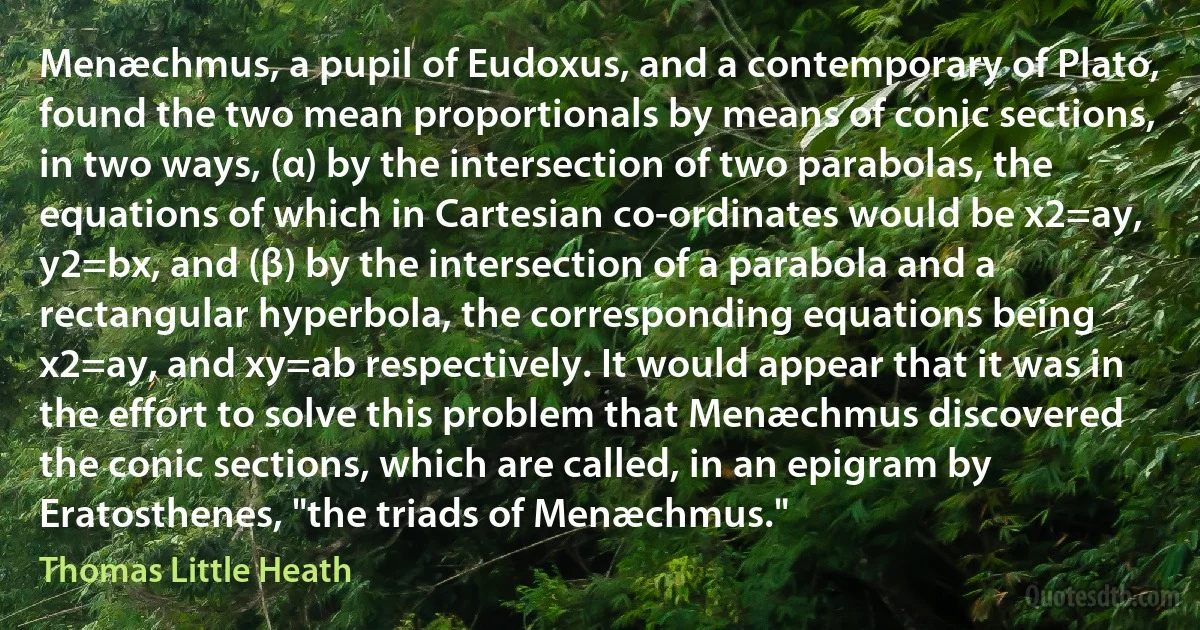Plato Quotes - page 6
Now the maximum of perfection is called ideal, by Plato, Idea - for instance, his Idea of a Republic - and is the principle of all that is contained under the general notion of any perfection, inasmuch as the lesser grades are not thought determinable but by limiting the maximum. But God, the Ideal of perfection, and hence the principle of cognition, is also, as existing really, the principle of the creation of all perfection.

Immanuel Kant
You always hear people say that philosophy makes no progress and that the same philosophical problems which were already preoccupying the Greeks are still troubling us today. But people who say that do not understand the reason why it has to be so. The reason is that our language has remained the same and always introduces us to the same questions.... I read: "philosophers are no nearer to the meaning of 'Reality' than Plato got,...". What a strange situation. How extraordinary that Plato could have got even as far as he did! Or that we could not get any further! Was it because Plato was so extremely clever?

Ludwig Wittgenstein
Adeimantus, in what amounts to an accusation of Socrates, asserts that the philosophers appear to be either useless or vicious. Plato, as I have suggested, teaches that ultimately this is an appearance that cannot be reversed, and this insures the philosophers' permanent marginality. They appear as useless because they are. They are neither artisans, nor statesmen, nor rhetoricians. They are idlers who contribute nothing to security or posterity. Their peculiar contemplative pleasures are not accessible to the majority of mankind, and they do not provide for the popular pleasures as do the poets.

Allan Bloom
I had this sense that ideas about democracy, theories of democracy which I had learned about of course from graduate school on, from Aristotle and Plato onward, that they were inadequate. I don't want to diminish them; I have always retained a great respect for classical and medieval and eighteenth-century theory, but meanwhile a whole new kind of political system emerged to which the term democracy became attached, and for which democracy remained an ideal, even though classical democracy as an ideal was so far removed from reality. The gap between that ideal and the actual political institutions that had developed, particularly from about the sixteenth, seventeenth century on, was just enormous. And what we didn't have enough of, had very little of, was an adequate description of what the actual institutions of so-called democracy, modern democracy, representative democracy, were.

Robert A. Dahl
Not much younger than these (sc. Hermotimus of Colophon and Philippus of Mende) is Euclid, who put together the Elements, collecting many of Eudoxus' theorems, perfecting many of Theaetetus', and also bringing to irrefragable demonstration the things which were only somewhat loosely proved by his predecessors. This man lived in the time of the first Ptolemy. For Archimedes, who came immediately after the first (Ptolemy), makes mention of Euclid: and, further, they say that Ptolemy once asked him if there was in geometry any shorter way than that of the elements, and he answered that there was no royal road to geometry. He is then younger than pupils of Plato but older than Eratosthenes and Archimedes; for the latter were contemporary with one another, as Eratosthenes somewhere says.

Proclus
But Hermotimus, the Colophonian, rendered more abundant what was formerly published by Eudoxus and Theætetus, and invented a multitude of elements, and wrote concerning some geometrical places. But Philippus the Mendæan, a disciple of Plato, and by him inflamed in the mathematical disciplines, both composed questions, according to the institutions of Plato, and proposed as the object of his enquiry whatever he thought conduced to the Platonic philosophy.

Proclus
Again, Amyclas the Heracleotean, one of Plato's familiars, and Menæchmus, the disciple, indeed, of Eudoxus, but conversant with Plato, and his brother Dinostratus, rendered the whole of geometry as yet more perfect. But Theudius, the Magnian, appears to have excelled, as well in mathematical disciplines, as in the rest of philosophy. For he constructed elements egregiously, and rendered many particulars more universal. Besides, Cyzicinus the Athenian, flourished at the same period, and became illustrious in other mathematical disciplines, but especially in geometry. These, therefore, resorted by turns to the Academy, and employed themselves in proposing common questions.

Proclus
But Eudoxus the Cnidian, who was somewhat junior to Leon, and the companion of Plato, first of all rendered the multitude of those theorems which are called universals more abundant; and to three proportions added three others; and things relative to a section, which received their commencement from Plato, he diffused into a richer multitude, employing also resolutions in the prosecution of these.

Proclus
There is a certain way of searching for the truth in mathematics that Plato is said first to have discovered; Theon named it analysis, and defined it as the assumption of that which is sought as if it were admitted and working through its consequences to what is admitted to be true. This is opposed to synthesis, which is the assuming what is admitted and working through its consequences to arrive at and to understand that which is sought.

Francois Viete
What noble thing have you produced by your pursuit of philosophy? Who of your most eminent men has been free from vain boasting? Diogenes, who made such a parade of his independence with his tub, was seized with a bowel complaint through eating a raw polypus, and so lost his life by gluttony. Aristippus, walking about in a purple robe, led a profligate life, in accordance with his professed opinions. Plato, a philosopher, was sold by Dionysius for his gormandizing propensities.

Tatian
Christian theology was a revised version of Greek philosophy and the effort Plato and his heirs made to discern the permanent behind the sensible, the Ideal and the Real behind the world of individual things - ever in flux, becoming and decaying and never, ever reliably and completely True.

William H. McNeill
To quote the words of Timaeus, in Plato, "What is that which always is, and has no birth, and what is that which is always becoming but never is? The one is apprehended by the mental processes, with reasoning, and is ever the same; the other can be guessed at by opinion in company with unreasoning sense, a thing which becomes and passes away, but never really is."
Therefore, if we crave for the goal which is worthy and fitting for man, namely happiness of life-and this is accomplished by philosophy alone and nothing else, and philosophy means... for us desire for wisdom, and wisdom the science of the truth of things... it is reasonable and most necessary to distinguish and systematize the accidental qualities of things.

Nicomachus
No more would I go along with Plato in exiling the poets, who play on the limbic cortex. Not even they are powerful enough to evoke the whole of man. If we are to survive our own destruction of our world and of ourselves by our advance of culture we had better learn soon to modify our genes to make us more intelligent. It is our last chance, that by increasing our diversity we may be able to make some sort of man that can survive without an ecological niche on this our earth. We may be able to live in gas masks and eat algae and distill the ocean.
I doubt that we have time enough.
We are, I think, nearing the end of a course that left the main line of evolution to overspecialize in brain to its own undoing.
Time will tell.

Warren S. McCulloch
"The work Was begun in 1913, but the bulk of it was written, as a distraction, during the first three years of the war, the hideous course of which seemed day by day to enforce the profound truth conveyed in the answer of Plato to the Delians. When they consulted him on the problem set them by the Oracle, namely that of duplicating the cube, he replied, 'It must be supposed, not that the god specially wished this problem solved, but that he would have the Greeks desist from war and wickedness and cultivate the Muses, so that, their passions being assuaged by philosophy and mathematics, they might live in innocent and mutually helpful intercourse with one another'.
Truly,Greece and her foundations are
Built below the tide of war,
Based on the crystàlline sea
Of thought and its eternity.

Thomas Little Heath
Plato in his 'Laws,' remarks that 'Atheism is a disease of the soul before it becomes an error of the understanding.' This just opinion, if applied to mere sensualists, who disbelieve in God because his holiness is a restraint upon their infamous passions, has since been applied to the pure thinkers like Spinoza, to whom it is an insult and an outrage. Let us see how little such a remark is applicable to those who thoughtfully pause before adopting a creed which, however dictated by a feeling of piety, is far less reverential than thoughtful silence.

George Holyoake



